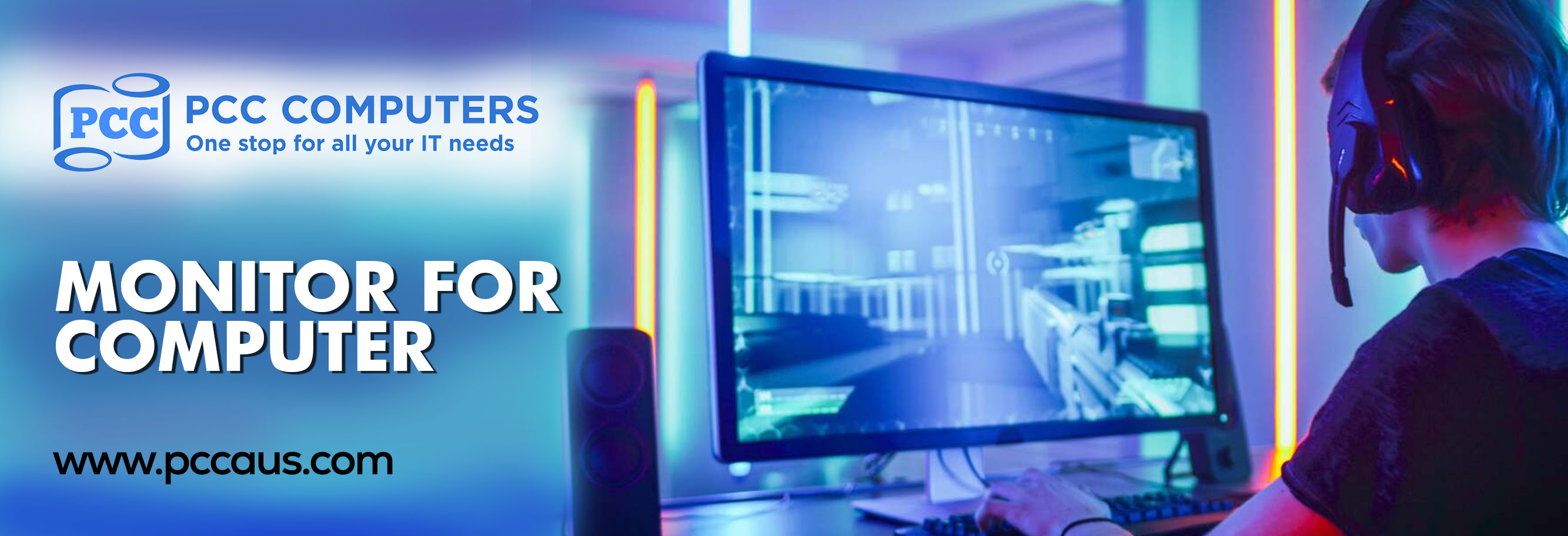Monitor for Computer: How to Choose the Right One for Your Needs

Monitor for Computer: How to Choose the Right One for Your Needs.
Choosing the best monitor for computer setups can be a challenging task, given the variety of options available today. Monitors are essential for everyday computing, whether you're working from home, gaming, or streaming videos. This blog will guide you through the different types of monitors, factors to consider when purchasing, and tips to find the perfect monitor for computer setups that suits your needs.
Why the Right Monitor for Computer Matters
The monitor for computer is one of the most critical components of any setup, directly affecting productivity, comfort, and the overall experience. A high-quality monitor can reduce eye strain, enhance viewing comfort, and even improve performance in activities like gaming or design work. But with so many choices available, from budget-friendly models to high-end 4K monitors, knowing what you need can make all the difference.
Types of Monitors for Computer
Before purchasing a monitor for computer, it’s essential to understand the different types available. Here are the most popular options:
LCD Monitors: Liquid Crystal Display (LCD) monitors are affordable and widely used. They offer decent picture quality and are energy-efficient, making them ideal for everyday office work and browsing.
LED Monitors: Light Emitting Diode (LED) monitors are essentially an upgraded version of LCD monitors. They use LED backlighting to enhance brightness, contrast, and color accuracy. LED monitors are often more energy-efficient and have a longer lifespan.
IPS Monitors: In-Plane Switching (IPS) monitors offer excellent color accuracy and wide viewing angles. They are perfect for professionals working in design, photography, and video editing who require precise color representation.
Gaming Monitors: Designed for high-performance gaming, these monitors typically feature a high refresh rate (120Hz or higher), low response times, and adaptive sync technologies like G-Sync or FreeSync. Gaming monitors deliver smooth and immersive experiences.
4K and Ultra HD Monitors: These monitors provide ultra-high definition resolutions of 3840 x 2160 pixels, offering incredible detail and clarity. They are ideal for professionals in creative fields or users who want the best visual quality.
Factors to Consider When Choosing a Monitor for Computer
When selecting a monitor for computer, consider the following factors to ensure it meets your specific requirements:
1. Screen Size and Resolution
The screen size and resolution of the monitor for computer are crucial factors, as they affect clarity and workspace. A larger monitor with a high resolution (such as 1080p, 1440p, or 4K) allows you to fit more content on the screen, which can improve productivity, especially for multitasking.
- 24-inch to 27-inch: These are ideal for most office setups.
- 32-inch or larger: Great for gaming or video editing, where more screen space is beneficial.
- Resolution: Full HD (1080p) is suitable for smaller monitors, while Quad HD (1440p) and 4K are ideal for larger screens for sharper image quality.
2. Refresh Rate and Response Time
A higher refresh rate means smoother visuals, especially in fast-paced scenarios like gaming or video editing. Monitors with 60Hz are standard, but a monitor for computer gaming purposes may have 120Hz, 144Hz, or even 240Hz refresh rates. Response time, measured in milliseconds, affects how quickly pixels change colors. A response time of 1-5ms is optimal for reducing motion blur.
3. Connectivity Options
Modern monitors for computer setups should have the necessary ports to connect your devices seamlessly. HDMI and DisplayPort connections are standard, but USB-C is becoming more popular, especially for those who want a one-cable solution that can handle power, data, and video.
4. Ergonomics and Adjustability
If you spend long hours working or gaming, an adjustable monitor for computer use is essential. Look for a monitor that offers tilt, swivel, height adjustment, and pivot options to improve your posture and reduce eye strain.
5. Color Accuracy and HDR Support
For graphic designers, video editors, and photographers, color accuracy is crucial. A monitor for computer setups with IPS technology generally offers better color reproduction. HDR (High Dynamic Range) support can also enhance color and contrast, making images more vibrant.
Top Recommended Monitors for Different Needs
Here are some top choices for monitor for computer users based on specific needs:
Best for Office Work: Dell Ultrasharp U2720Q – This 27-inch 4K monitor offers excellent color accuracy, an adjustable stand, and multiple connectivity options, making it perfect for productivity.
Best for Gaming: ASUS ROG Swift PG279Q – A 27-inch, 1440p monitor with a 165Hz refresh rate, G-Sync support, and a low response time, this monitor provides a fantastic gaming experience.
Best Budget Option: Acer R240HY – A 24-inch IPS monitor with Full HD resolution, offering good color accuracy and a sleek design at an affordable price.
Best for Designers: BenQ PD3220U – This 32-inch 4K monitor with HDR support and high color accuracy is designed for creative professionals who need precise color representation.
Final Thoughts
Selecting the right monitor for computer setups can significantly enhance your overall experience, whether you're working, gaming, or streaming. Consider your primary usage and the features most important to you, such as screen size, resolution, refresh rate, and color accuracy. With the right monitor for computer use, you’ll enjoy better productivity, sharper visuals, and a more immersive experience.
Whether you're upgrading your home office or setting up a gaming station, investing in a high-quality monitor is worth every penny. Make sure to research and compare options to find the perfect monitor that meets your unique requirements.



